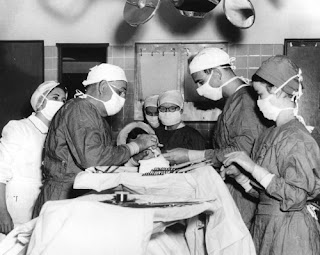He began shaping my life when I was seventeen. My uncle had told him I wanted to be a doctor. Around midnight a few weeks later I was awakened. “There has been a terrible accident. A man is badly hurt. Do you want to help in surgery?”
Gentle reader entertain conjecture of a time unburdened by paper work, a time free of medical malpractice suits, a time when physicians not the government or insurance companies determined what was best for the patient, a time when a good history and physical examination preempted diagnostic tests. Contemplate when a simpler time rendered medicine fun and fulfilling.
The era you have imagined had no pagers, no cell phones, no fax machines, no computers, no copiers, and no highway patrol with radar guns. The roads were narrow and poorly marked. The cars had no seat belts.
Under this veil of simplicity a middle-aged man taking a curve in a country road too fast was thrown from his car. A telephone poll made him a wishbone. He entered the operating room with a ripped pelvis, two fractured hips, a ruptured spleen and assorted other injuries considered major on an ordinary Saturday night.
That man’s misadventure introduced me to the mystery, majesty, and magic of surgery. Except for back-seat-of-the-car moon flooded nights that surgical experience was the most fun I had as a teenager.
After that I worked as his surgical assistant for four summers. In addition to the routine gall bladders, appendectomies, and bowel and bladder surgery, we also repaired abdominal aneurisms, patched those gored by bulls, thrown from horses, flipped by tractors, bit by mules, and hit over the head with beer bottles.
I went with him on house calls. I sat up with him at night watching over gravely ill patients. I was there when he told the family that their loved one had inoperable cancer and when we visited the homes of those who had died. I helped with autopsies and worked in his lab. By the time I was in medical school I had seen and done more than a first year surgical resident.
His hands were small but powerful and steady, always steady. He worked methodically and meticulously. Like a chess master he had five or six moves planned ahead. He was always on the offensive, defeating disease, death, and destruction. He never hurried yet he finished his cases in record time. I never saw him flustered or tired. After a long night of trauma surgery he was eager to start on the scheduled gall bladders and hernias.
I was not blinded to his faults. He was sloppy. Each new day his hair competed with his clothes for most rumpled. He slumped. Slurred his speech. Chain-smoked. He burped and scratched at the most inopportune times. His deficiencies would have rendered Emily Post speechless.
Although he pioneered several surgical techniques his empirical approaches remained unknown because he was the least of self-promoters, if that’s a fault. Grimes county citizens and those that lived beyond had no idea that a surgical Michelangelo lived among them.
Of all those professional experiences that are a pleasure to recall my time with Leonard loom largest. He taught the character and skills of a good physician. He was a modest, kind gentlemen most informal in his daily contacts beloved by just about everyone who looked forward to his visits that offered encouragement, optimism and hope to all he met. To relieve suffering and to heal the sick—that was Leonard’s work.
Memory can be a perpetual stimulation for living life well. A yearning for past experiences can be relieved by enthusiasm for things yet undone.
